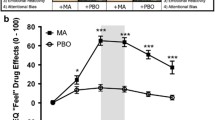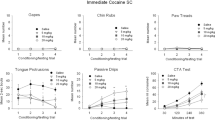Abstract
Subjects with a history of free-basing and smoking cocaine but no history of opiate injections were exposed to three sets of stimuli. They received cocaine-related stimuli in one session, opiate-related stimuli in a second session, and non-drug stimuli on a third occasion. Compared to the opiate and non-drug cues, the cocaine-related events caused reliable decreases in skin temperature and skin resistance, and reliable increases in heart rate, self-reported cocaine craving, and self-reported cocaine withdrawal. Furthermore, control subjects lacking a history of cocaine or opiate use failed to show such differential responding. These results suggest that cocaine-related stimuli evoke Pavlovian conditioned responses in cocaine abuse patients. Such findings encourage continuing efforts to develop drug treatment strategies based on conditioning principles.
Similar content being viewed by others
References
Baker TB, Morse E, Sherman JE (1987) The motivation to use drugs: a psychobiological analysis of urges. In: Rivers C (ed) The Nebraska symposium on motivation: alcohol use and abuse. University of Nebraska Press, Lincoln, NE, pp 257–323
Chandler BC, Parsons OA, Vega A (1975) Autonomic functioning in alcoholics: a study of heart rate and skin conductance. J Stud Alcohol 36:566–577
Childress AR, McLellan AT, O'Brien CP (1986a) Abstinent opiate abusers exhibit conditioned craving, conditioned withdrawal, and reductions in both through extinction. Br J Addict 81:655–660
Childress AR, McLellan AT, O'Brien CP (1986b) Conditioned responses in a methadone population: A comparison of laboratory, clinic and natural setting. J Subst Abuse Treat 3:173–179
Childress AR, Ehrman RN, McLellan AT, O'Brien CP (1988) Conditioned craving and arousal in cocaine addiction: a preliminary report. NIDA Res Monogr 81:74–80
Childress AR, McLellan AT, Natale M, O'Brien CP (1987) Mood states can elicit conditioned withdrawal and craving in opiate abuse patients. NIDA Res Monogr 76:137–144
Ehrman RN, Robbins SJ, Childress AR, McLellan AT, O'Brien, CP (1992) Responding to drug-related stimuli in humans as a function of drug-use history. NIDA Res Monogr: proceedings of the 1990 International Drug Discrimination Symposium
Kaiser L (1989) Adjusting for baseline: change or percentage change? Stat Med 8:1183–1190
Laberg JC (1990) What is presented, and what prevented, in cue exposure and response prevention with alcohol dependent subjects? Addict Behav 15:367–386
McNair D, Lorr M, Droppleman L (1971) Manual: profile of mood states. Educational and Industrial Testing Service, San Diego
O'Brien CP, Ehrman RN, Ternes JW (1986) Classical conditioning in human opioid dependence. In: Goldberg SR, Stolerman IP (eds) Behavioral analysis of drug dependence. Academic Press, Orlando, FL, pp 329–356
O'Brien CP, Childress AR, McLellan AT, Ehrman RN (1990) Integrating systematic cue exposure with standard treatment in recovering drug dependent patients. Addict Behav 15:355–365
Powell J, Gray JA, Bradley BP, Kasvikis Y, Strang J, Barratt L, Marks I (1990) The effects of exposure to drug-related cues in detoxified opiate addicts: a theoretical review and some new data. Addict Behav 15:339–354
Robbins SJ, Ehrman RN (1992) Designing studies of drug conditioning in humans. Psychopharmacology 106:143–153
Sherman JE, Jorenby MS, Baker TB (1988) Classical conditioning with alcohol: Acquired preferences and aversions, tolerance and urges/craving. In: Wilkinson DA, Chaudron D (eds) Theories of alcoholism. Addiction Research Foundation, Toronto, pp 173–237
Siegel S (1979) The role of conditioning in drug tolerance and addiction. In: Keehn JD (ed) Psychopathology in animals: research and treatment implications. Academic Press, New York, pp 143–168
Stewart J, deWit H, Eikelboom R (1984) The role of unconditioned and conditioned drug effects in the self-administration of opiates and stimulants. Psychol Rev 91:251–268
Wikler A (1965) Conditioning factors in opiate addiction and relapse. In: Wilner DI, Kassenbaum GG (eds) Narcotics. McGraw-Hill, New York, pp 85–100
Author information
Authors and Affiliations
Rights and permissions
About this article
Cite this article
Ehrman, R.N., Robbins, S.J., Childress, A.R. et al. Conditioned responses to cocaine-related stimuli in cocaine abuse patients. Psychopharmacology 107, 523–529 (1992). https://doi.org/10.1007/BF02245266
Received:
Revised:
Issue Date:
DOI: https://doi.org/10.1007/BF02245266




